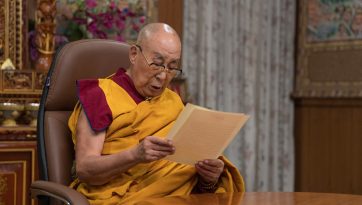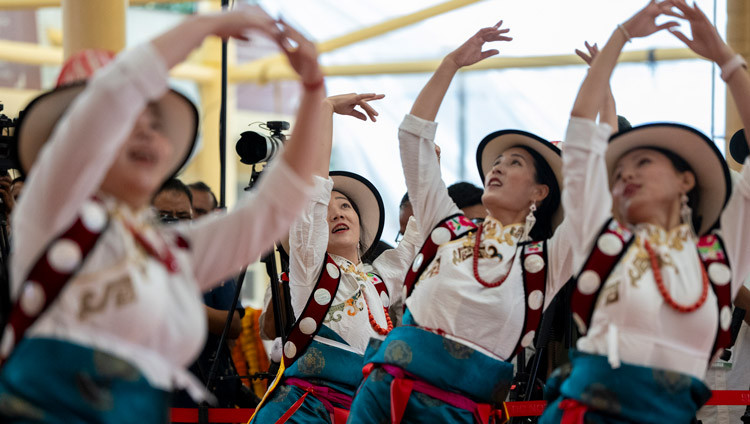Rare footage shows extreme measures of Tibetan protestors
Reporter: Stephen McDonell, Australian Broadcasting Corporation, 09 October 2012
To view a video taken inside Tibet, click here.
Transcript
STEPHEN MCDONELL, REPORTER: In the remote Tibetan regions of western China, there is much that haven’t changed for centuries. But behind these tranquil scene there’s are simmering tensions. Some Tibetans are so disenchanted with Chinese rule that their protests are taking a shocking and extreme form.
After dousing themselves in flammable liquids, more than 50 people – mostly young monks – have set themselves on fire. In the last 12 months at least 42 have died. The Chinese government has been in damage control.
LIU WEIMIN, CHINESE FOREIGN MINISTRY SPOKESMAN (translated): We believe that the recent series of events have clearly been masterminded and stirred up by someone behind the scenes.
STEPHEN MCDONELL: The head of the Indian-based Tibetan government in exile was in Australia earlier this year.
LOBSANG SANGAY, TIBETAN PRIME MINISTER IN EXILE: The blame and solution lies with the Chinese government, and self-immolators have made it very clear. We want basic freedom like any human being, like any Australians.
STEPHEN MCDONELL: The Tibetan plateau is, for the most part, a no-go zone for foreign journalists. But we find a way to sneak into the area in Sichuan province which has seen the most number of suicides.
Winter is coming and here nomads are on the move. They’ve broken camp in the high mountains and are heading to lower altitudes to prepare for the cold. It can be a hard life dictated by the elements, but they breed them pretty tough in the Himalayas.
TIBETAN MAN (translated): What we are doing here is cutting grass for the yaks and sheep to eat in the winter time. This is still a very traditional Tibetan area.
STEPHEN MCDONELL (speaking Chinese, translated): So your father’s father was doing this, and his father too?
TIBETAN MAN (translated): Yes, that’s right.
STEPHEN MCDONELL: This young man is proud of his heritage, which he says the bound up in Buddhism.
TIBETAN MAN (translated): The most important thing in our lives is culture. It’s in our work – everything. It comes from books so the monasteries are our most important source.
STEPHEN MCDONELL: But there’s much that people will not talk about openly. It’s very difficult to get away from the authorities in Tibetan areas. In villages like this there are eyes and ears everywhere, so even if we can make contact with ordinary people and if they know about the immolations they don’t really want to talk about it, especially not on camera.
Yet if you spend enough time here, there are those who will speak. We find a monk in a small mountain house helping a poor family. He’s certainly heard about his young brothers killing themselves nearby.
BUDDHIST MONK (translated): They feel unsettled in their hearts, that’s why they set themselves on fire.
STEPHEN MCDONELL: A short distance from where we meet this monk is Aba. Footage secretly filmed inside this locked-down town shows it chocked full of military police and SWAT teams. The streets are barricaded as if in a war zone – something akin to Northern Ireland at the height of the Troubles.
Aba town alone counts for 24 self-immolations. It’s hard to imagine the desperation that leads young Tibetans to protest by taking their lives in this most agonising way.
LOBSANG SANGAY: We have discouraged drastic actions, including self-immolations, but unfortunately Tibetans seem to be saying this is the only form of protest left, because any other form of protest the consequences is similar – you get arrested, tortured and often die.
STEPHEN MCDONELL: Earlier this year, the mayor of Aba made a rare public appearance to condemn the immolations in his town.
WU ZEGANG, ABA PREFECTURE MAYOR (translated): Before taking these actions they have shouted out separatist slogans like “Free Tibet”.
STEPHEN MCDONELL: And the Chinese government says it knows who is ultimately to blame.
WE ZEGANG (translated): The Dalai Lama has not tried to prevent these activities, but he has encouraged these anti-human, anti-social acts of terror.
LOBSANG SANGAY: If the Chinese Government wants to see an end to self-immolation and various forms of protest inside Tibet: open up Tibet, liberalise Tibet, treat them humanely, give them basic freedom.
STEPHEN MCDONELL: Every Tibetan town we visit is crawling with police. We’re inevitably seen, and from this point each time we walk out the door people are waiting for us. The same cars appear behind us again and again, and spotters start popping up all over the place. So we head for the hills.
A government vehicle comes around the mountain. It’s carrying the same officers we saw earlier in town.
(Speaking Chinese to officials, translated) Sorry, who are you?
CHINESE OFFICIAL (translated): He’s from the county foreign affairs office.
CHINESE OFFICIAL II (translated): Don’t film us. We can’t be filmed.
STEPHEN MCDONELL (speaking Chinese, translated): Let’s see your ID. How do I know who you are?
They question our producer and driver, then let us know that they’re here out of concern for our well-being. We’re told that Tibetan dogs could pose a threat to us. After checking our passports, they tell us we can’t be here without permission. We’re allowed to go if we move on.
But after driving all day, in the next town we’re met by a new team of government officials and police.
CHINESE OFFICIAL: Xiahe is not open to foreign journalists.
STEPHEN MCDONELL: Pressure is now on to leave the region entirely. So the next day we get up earlier than those pursuing us and have one last crack at talking to people. We arrive at the Lablang monastery. It has the largest number of monks outside the official Tibetan Autonomous Region, and has been the site of protests calling for human rights to be respected. Here we meet a woman who wants to speak to us. What she has to say is precisely what the authorities don’t want us to hear.
TIBETAN WOMAN (translated): People self-immolating – yes, I’ve heard of it. They forced those people to die. There is something wrong with the Communist Party and this country.
STEPHEN MCDONELL (speaking Chinese, translated): Sorry, whose fault did you say it was?
TIBETAN WOMAN (translated): The reason they committed suicide is that the monasteries have lots of difficulties in this country. We don’t have any rights, even the right of speech. They tell us exactly what we have to say. If we speak the truth, they will arrest us and beat us to death.
STEPHEN MCDONELL: She says she’s a devout Buddhist and not afraid to speak out, but given the highly sensitive nature of her comments we’ve decided to protect her identity. She speaks, for example, about the monasteries being infiltrated by monks on the payroll of the government.
TIBETAN WOMAN (translated): Some lamas are evil. They are dressed in lama’s clothes but, if the country gives them money, they will take it and are willing to do whatever the government tells them to do.
STEPHEN MCDONELL: She says that most Tibetans are poor with no hope of improving their lives. And, as for a solution to the problem of young monks killing themselves here…
TIBETAN WOMAN (translated): All countries in the world should pray together for the downfall of the Communist Party so it’s not here anymore. They are extremely bad.
STEPHEN MCDONELL: Again, police and government officials find us, and this time there’s no getting away. They’re angry that we haven’t already left town.
(To police officer) Why does it matter? Why do you want us to go?
POLICE OFFICER: Because [inaudible] this is our government has consideration…
STEPHEN MCDONELL: But why? What is the problem?
POLICE OFFICER: Because you’re a journalist.
STEPHEN MCDONELL: But… we’re journalists, we go to lots of places. What is the problem here?
POLICE OFFICER: Because this is a Tibetan area. I’m very sorry.
STEPHEN MCDONELL: We’re escorted out of town until they make sure we’re leaving the area well and truly. Behind us is fear, resentment and tragedy, along with government policies showing no sign of winning over Tibetans.




